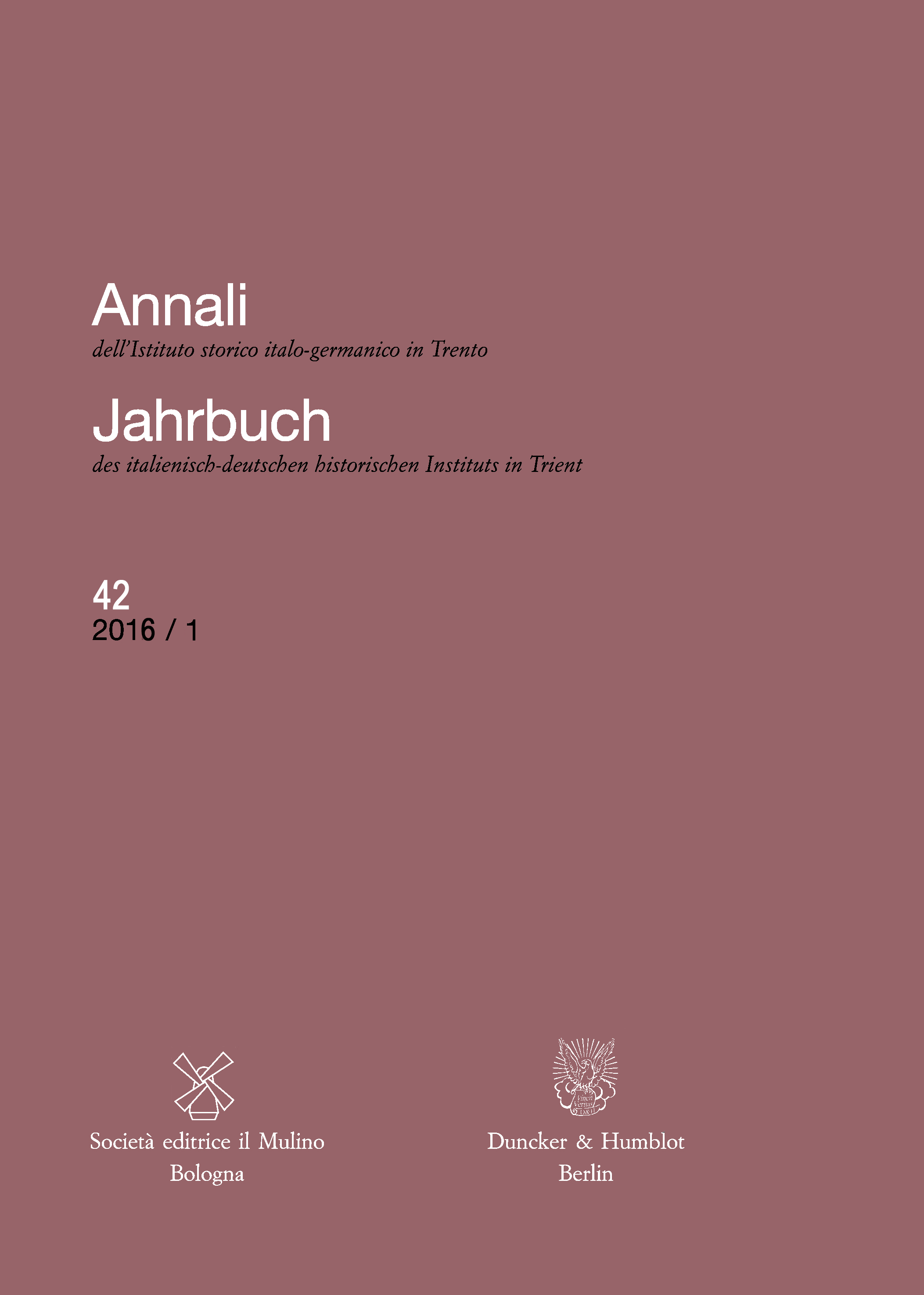Annali dell'Istituto storico italo-germanico in Trento | Jahrbuch des italienisch-deutschen historischen Instituts in Trient, 42, 2016/1

Editore: il Mulino - Duncker&Humblot
Città: Bologna
Anno: 2016
Pagine: 133
Cartaceo
Indice
Editoriale | pp. 5
Saggi
- Stefan Berger, Le vie e le false piste del socialismo democratico. Il rapporto del Labour Party e della Sozialdemokratische Partei Deutschlands con il capitalismo nel XIX e nel XX secolo
pp. 11-28 - Bernhard Weidinger, «Burschenschaften», nazionalismo «völkisch» e il conflitto sull’Alto Adige/Südtirol dopo il 1945
pp. 29-57 - Martin Knoll, Spunti perialpini su turismo e trasformazione regionale in Europa
pp. 59-95
Recensioni
- G. Albertoni, Johannes Fried, Karl der Grosse. Gewalt und Glaube. Eine Biographie
pp. 99-102 - K. Occhi, Christian Hagen, Fürstliche Herrschaft und kommunale Teilhabe. Die Städte der Grafschaft Tirol im Spätmittelalter
pp. 102-105 - M. Rospocher, Jochen Sander (ed), Raffael und das Porträt Julius’ II. Das Bild eines Renaissance-Papstes
pp. 105-107 - M. Bellabarba, Christian Wieland, Nach der Fehde. Studien zur Interaktion von Adel und Rechtssystem am Beginn der Neuzeit: Bayern 1500-1600
pp. 107-109 - C. Ferlan, Bernd Hausberger, Die Verknüpfung der Welt. Geschichte der frühen Globalisierung vom 16. bis zum 18. Jahrhundert
pp. 109-112 - É. Delivré, Claudie Paye, «Der französischen Sprache mächtig». Kommunikation im Spannungsfeld von Sprachen und Kulturen im Königreich Westphalen 1807-1813
pp. 112-115 - M. Tamborini, Michael Ohl, Die Kunst der Benennung
pp. 116-119 - G. Bernardini, Joanne Miyang Cho - David M. Crowe (edd), Germany and China. Transnational Encounters since the Eighteenth Century
pp. 119-121 - F. Alfieri, Jan Plamper, The History of Emotions. An Introduction
pp. 122-124
Bollettino
- Attività convegnistica | pp. 127
- Attività editoriale | pp. 131
- Biblioteca | pp. 133
- Autori | pp. 135
Autori
- Giuseppe Albertoni, professore associato di Storia medievale presso l’Università di Trento
- Fernanda Alfieri, ricercatrice FBK-ISIG
- Marco Bellabarba, professore associato di Storia moderna presso l’Università di Trento
- Stefan Berger, professore di Storia sociale presso la Ruhr-Universität di Bochum
- Giovanni Bernardini, ricercatore FBK-ISIG
- Émilie Delivré, ricercatrice FBK-ISIG
- Claudio Ferlan, ricercatore FBK-ISIG
- Martin Knoll, professore di Storia regionale europea presso l’Università di Salisburgo
- Katia Occhi, ricercatrice FBK-ISIG
- Massimo Rospocher, ricercatore FBK-ISIG
- Marco Tamborini, ricercatore di Storia e fi losofi a della biologia presso il Museum für Naturkunde di Berlino
- Bernhard Weidinger, ricercatore di Storia contemporanea presso l’Università di Vienna
Abstract
Stefan Berger - Le vie e le false piste del socialismo democratico. Il rapporto del Labour Party e della Sozialdemokratische Partei Deutschlands con il capitalismo nel XIX e nel XX secolo
This paper presents a comparative study of the development of democratic socialism in Germany and Great Britain in the nineteenth and twentieth centuries. The prevailing opinion that the two major social democratic workers’ parties, the Social Democratic Party (SPD) and the Labour Party, represent different types of workers’ parties is dismissed. Instead, many parallels and similarities are discussed and it is argued that different ideological and organizational developments must be contextualized according to situations instead of being attributed to inherently different character traits. Particular attention is paid to both parties’ attitudes toward capitalism and in this context, it becomes clear that for a long time both parties preferred an abolition of capitalism to democratic political reforms, which led to democratic deficits.
Bernhard Weidinger - «Burschenschaften», nazionalismo «völkisch» e il confl itto sull’Alto Adige/Südtirol dopo il 1945
Burschenschaften, as a particular type of German-nationalist student fraternity, have partaken in shaping Austrian politics in numerous ways since the nineteenth century. Based on sources from fraternity archives, this article addresses their involvement in the conflict over South Tyrol. It assesses the importance awarded to the topic by Austrian Burschenschaften, portrays the various ways in which they intervened in the conflict, and assesses how these interventions influenced the course of events. Particular attention is given to the central role of fraternity members in the conflict’s violent escalation in the 1960s. On a more general level, the case serves to illustrate the differences between a völkisch (rigidly ethno-nationalist and anti-individualist) perspective on ethnic and minority rights, and a universalist-democratic approach.
Martin Knoll - Spunti perialpini su turismo e trasformazione regionale in Europa
The article deals with the nineteenth- and twentieth-century history of tourism, a phenomenon recently labeled by historian John K. Walton as «the world’s most powerful and pervasive cluster of commercial and industrial activities» with enormous social, cultural, and environmental impact. Advocating a regional history perspective on tourism in Europe, the article comments on recent historiography focusing on the connection between tourism development and regional change. Regional history as well as tourism history are historiographical subdisciplines with strong interdisciplinary links. One aim of this paper is to evaluate the analytical potential of different concepts of regionality based in different disciplines. A further topic is the role of different kinds of mobility as prerequisites of tourism-induced regional change. Finally, light is shed on the history of tourism and regional change from the angle of cities, urbanity, and city-hinterland-relations.

